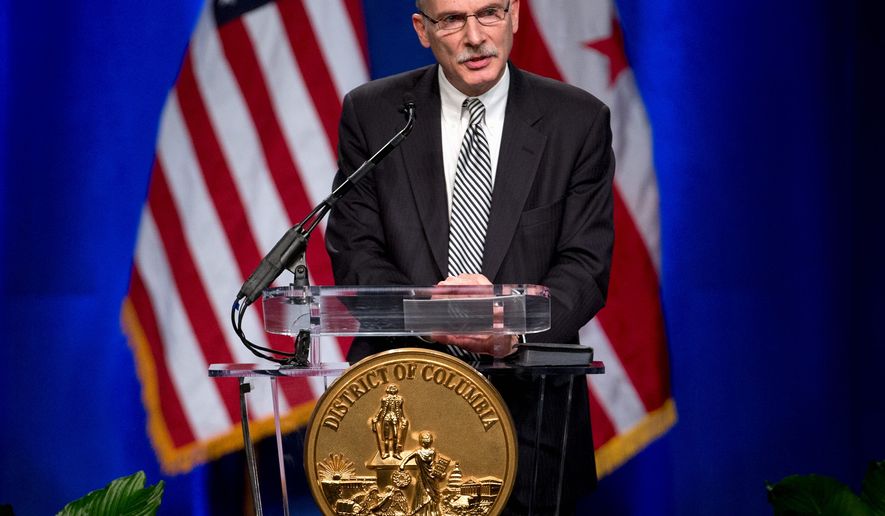The D.C. Council voted Tuesday to cut income and business taxes in September rather than putting off the reductions until early next year.
Mayor Muriel Bowser and a contingent of newly elected council members sought to hold off on the tax cuts until February, arguing that more discussion of the issue was needed. But council Chairman Phil Mendelson garnered just enough support — seven of the 13 council members — to move forward the date the second phase in a series of tax cuts would take effect.
“If we put off the triggers, we put off the tax relief for residents. That’s all we do,” Mr. Mendelson said ahead of the contentious vote. “There is nothing else that happens to the dollars. They go to the bottom line. It’s whether residents receive relief this year or not.”
The package of tax cuts was adopted by the D.C. Council last year based on recommendations made by a blue-ribbon commission that spent more than a year studying taxation in the District. The first reductions went into effect this year. The full extent of the tax relief package was meant to be implemented over five years, so long as city revenues continue to increase and fund the cuts.
First in line for implementation in September are cuts that would reduce the income tax rate from 7 percent to 6.75 percent for those earning between $40,000 to $60,000; creation of a new 8.75 percent tax bracket for those earning between $350,000 and $1 million; and a reduction of the business franchise tax from 9.4 percent to 9.2 percent.
Hours after the vote, the chief financial officer released June revenue estimates that would appear to fund at least some of the tax cuts — with revised city revenues up $117 million to a total of $6.7 billion in fiscal 2015.
“While some of the additional revenue will go toward paying for unfunded liabilities, we will make sure that everyone benefits from our city’s success,” Ms. Bowser said in a statement on the revenue estimates. “We will do that by continuing to invest in initiatives that will create pathways to the middle class for all District residents.”
The uptick in revenue was attributed to stronger-than-expected wage growth and income tax filings.
Under the full rollout of the tax relief package, people earning $25,000 to $50,000 would save an average of $352 on their tax bills, while those who earn $75,000 to $100,000 would save an average of $602. Businesses, which would eventually see franchise taxes reduced to 8.25 percent, would save an average of $8,625 on a bill for $500,000 of taxable income and save $34,500 at a $2 million taxable income level.
Ms. Bowser, who, when she was on the council, voted for the tax cut package, has said the money might be needed for spending priorities such as schools or affordable housing.
Opposition to moving up the time frame for the cuts — Mr. Mendelson initially proposed implementing them in June — came mostly from council members who took office after the May 2014 approval of the full tax relief package. Five new council members have taken office since then, including four who voted to delay the next increment of cuts. Those who voted to unsuccessfully delay the tax cuts to February are Yvette Alexander, LaRuby May, Brianne Nadeau, Vincent Orange, Elissa Silverman and Brandon Todd.
“The most progressive things have already been done,” said Ms. Silverman, At large independent. “We are not interested in changing the package but in having discussion about it.”
Others, like Ms. Alexander, said she’d rather wait to see the city’s revenue estimates before implementing additional cuts.
Council member Mary Cheh was skeptical that those who opposed moving up the cuts would actually like to do away with some of the remainder of the tax relief package.
“All of these arguments are the same arguments that will be trotted out when February comes along,” the Ward 3 Democrat said. “This is a guerrilla action to try to frustrate these tax breaks.”
• Andrea Noble can be reached at anoble@washingtontimes.com.




Please read our comment policy before commenting.